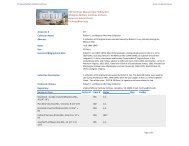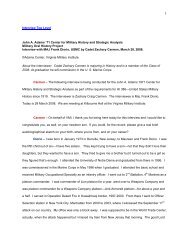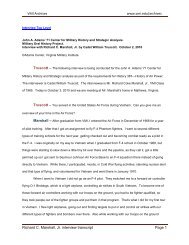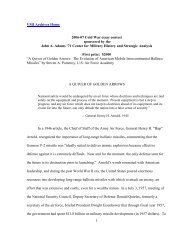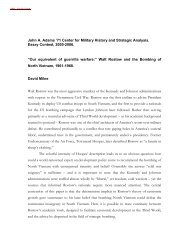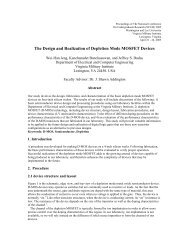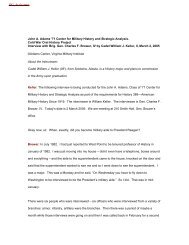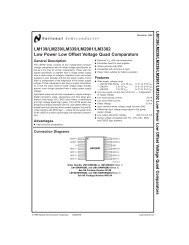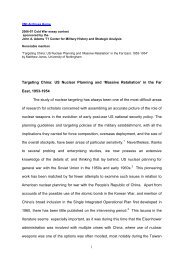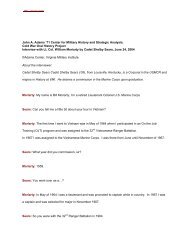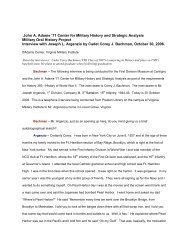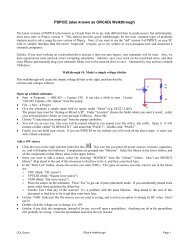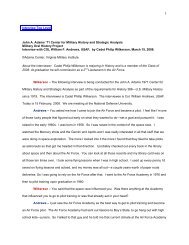Academic Catalog - Virginia Military Institute Admissions
Academic Catalog - Virginia Military Institute Admissions
Academic Catalog - Virginia Military Institute Admissions
Create successful ePaper yourself
Turn your PDF publications into a flip-book with our unique Google optimized e-Paper software.
<strong>Virginia</strong> <strong>Military</strong> <strong>Institute</strong><br />
12-13 <strong>Catalog</strong>ue<br />
EC 415. POLITICAL ECONOMY OF CONFLICT 3—0—3<br />
This course will apply the principles of economics and game theory to understanding the<br />
nature of conflict. This understanding will be used to motivate debate about the national<br />
security priorities of the US. Prerequisites: EC 201 and 202 with a grade of C or better.<br />
EC 421. QUANTITATIVE APPLICATIONS IN ECON & BUSINESS 3—0—3<br />
Quantitative decision models are an aid to decision makers in economics and in the<br />
functional business domains of finance, operations, and marketing. Several quantitative<br />
modeling techniques are introduced in this course, including linear programming, nonlinear<br />
optimization, decision trees, simulation, and queuing models. Solution techniques using<br />
spreadsheets and add-in software are emphasized. Applications to economics include<br />
determining optimal pricing and production strategies under uncertainty for firms competing<br />
in the market structures of monopoly, monopolistic competition, and oligopoly. Prerequisite:<br />
EC 201, EC 202, and EC 303 with a grade of C or better (or equivalent probability or statistics<br />
course), or permission of instructor.<br />
EC 422. INDUSTRIAL ORGANIZATION 3—0—3<br />
Microeconomics-based theories of transaction costs, game theory, and information theory<br />
to explain the structure of firms and markets and their interactions. While the traditional<br />
Structure-Conduct-Performance analysis is used as a general framework, the analyses<br />
include, but go beyond the idealized markets presented in introductory microeconomics<br />
and take a closer look at why firms and markets have evolved into what we observe today.<br />
Consider this course an “applied microeconomics” course. Prerequisites: EC 201 and EC<br />
202 with a C or better, and EC 300 (completed or concurrent) or permission of instructor.<br />
EC 430. FINANCIAL MODELING 3—0—3<br />
An introduction to the concepts, methodologies, and applications of spreadsheet and<br />
simulation models in finance. Students will be required to use Excel & Crystal Ball, and Excel<br />
add-in software package, to design and build financial models for capital budgeting, portfolio<br />
allocation, value at-risk, simulation of financial time series, and financial option valuation.<br />
Prerequisites: EC 303 and BU 310 with a grade of C or better or permission of instructor.<br />
EC 435X. institutions and economic development 3—0—3<br />
This course will explore the determinants of institutions: how they evolve, and how they<br />
affect economic development. Topics include: differences between common law and civil<br />
law systems; the significance of a country's colonial origin; the effects of religious beliefs;<br />
and the importance of trust in political institutions. Other topics include: the transplantation<br />
of formal institutions vs. indigenous institutions; the effects of international aid on economic<br />
and institutional development; and the origins of corruption and why it is more prevalent in<br />
some cultures than in others. Prerequisites: EC 201-202 (basic knowledge of econometrics<br />
and statistics is beneficial).<br />
EC 450-451. TOPICS IN ECONOMICS 3—0—3<br />
Selected topics in economics as suggested by members of the faculty and/or cadets.<br />
Subject and content to be announced before the semester in which the course is to be<br />
taught. Offered as announced. Prerequisite: Permission of Instructor.<br />
EC 460-461. INDEPENDENT RESEARCH IN ECONOMICS 0—2—1 to 0—6—3<br />
Independent research designed for cadets who desire to pursue a research interest in<br />
economics under the direction of a faculty member. Prerequisite: An overall GPA of 2.7 and<br />
permission of instructor and department head.<br />
EC 470. HONORS RESEARCH IN ECONOMICS 0—2—1 to 0—6—3<br />
Designed for cadets pursuing independent research under the direction of a faculty<br />
member leading to departmental honors. Prerequisite: A 3.2 GPA overall and in all economics<br />
courses. Permission of instructor, department honors committee, and the department head.<br />
EC 480-481. ECONOMICS INTERNSHIP 0—0—0 to 0—0—3<br />
Under the supervision of a department faculty adviser, cadets may earn up to three hours<br />
of academic credit as an economics elective in a summer internship of at least 8 weeks<br />
duration in a full-time position. Internships will normally be conducted with a private firm, a<br />
governmental agency, or a non-profit organization. <strong>Academic</strong> credit as a free elective may<br />
be awarded for a second internship, under the provisions specified by the department head.<br />
Prerequisite: a 2.8 GPA overall and in all economics courses, and permission of internship<br />
coordinator, the internship faculty adviser, and the department head.<br />
Upon the completion of all the academic and employment requirements of the summer<br />
internship for credit program, cadets may earn 3 hours of academic credit per summer for<br />
either EC 480 and 481 or BU 480 and 481, although no more than three hours can count<br />
towards graduation.<br />
EDUCATION<br />
DIRECTOR OF TEACHER CERTIFICATION:<br />
LIEUTENANT ColONEl ELAINE HUMPHREY<br />
See teacher certification, page 76.<br />
ED 200. FOUNDATIONS OF EDUCATION 3—0—3<br />
The goals of this introductory course are the following: (1) acquaint students with the<br />
philosophical schools of thought in education and with prominent educators whose<br />
contributions have shaped educational theory and practice; (2) provide a historical, social,<br />
and economic perspective on the principles of education in the United States; (3) show<br />
prospective teachers the role of educational institutions and practices in the social structure<br />
of modern American society; (4) enhance students’ skills in reading, writing, thinking and<br />
discussing educational issues critically and analytically. Required for teacher certification.<br />
Open to other students with permission of the instructor.<br />
ED 210. PRACTICUM IN EDUCATION 1—3—1<br />
This course provides students who are contemplating teaching as a career an opportunity<br />
to acquire early and varied experiences in the local area schools. Students may enroll in the<br />
course several times until they have earned a total of three credits, the minimum required for<br />
teacher licensure. Required for teacher certification. Open to other students with permission<br />
of the Director of Teacher Certification.<br />
ED 302. UNDERSTANDING EXCEPTIONAL INDIVIDUALS 3—0—3<br />
This is a general survey course that addresses education for exceptional individuals by<br />
focusing on etiology, inclusion, identification, and incidence. The course presents, as well, an<br />
overview of the methods used by teachers, administrators, and parents to provide education<br />
to exceptional students. Also covered are the major educational issues involved in providing<br />
instruction for individuals served by special education services and by programs for the<br />
gifted. Consequently, the course examines the educational, social and cultural dimensions<br />
of life in American society for individuals with disabilities and for individuals who are gifted.<br />
Required for teacher certification. Open to other students with permission of the instructor.<br />
ED 303. TEACHING AND LEARNING IN THE CONTENT AREAS 3—0—3<br />
This is a course specifically for those who wish to teach on the middle or secondary level.<br />
The course examines research on instruction in all content areas. Students will have the<br />
opportunity to read and critique articles on reading instruction across the curriculum as well<br />
as comprehension theory. In addition, the major learning theories of educational psychology<br />
will be covered as they relate to the organization of instructional material. Students will design<br />
and field test learning activities based on current theories of instruction. Required for teacher<br />
certification. Open to other students with permission of instructor.<br />
ED 401. SECONDARY SCHOOL METHODS AND PRATICUM 3—3—4<br />
Those students seeking licensure to teach at the secondary level take this course to learn<br />
how to design methods and materials for secondary education. Through the course, students<br />
demonstrate their knowledge and skills in the following areas: setting goals and objectives;<br />
unit and lesson planning; varying teaching techniques; managing classrooms; building reading<br />
and study skills into the content areas; individualizing instruction; measuring and evaluating<br />
learning; selecting teaching materials; using multimedia; developing an effective teaching<br />
style; and developing confidence in speaking before students and peers. Observation and<br />
participation in area schools provide students with the opportunity to integrate teaching<br />
theory with practice. This is a prerequisite for student teaching and is required for teaching<br />
certification. Open to other students with permission of the Director of Teacher Certification.<br />
ED 402. STUDENT TEACHING AND SEMINAR 3—25—15<br />
This course is open only to students who are serious candidates for teacher licensure.<br />
Students must be accepted in VMI’s teacher certification program and have met the<br />
prerequisites for student teaching as delineated in the requirements for teacher licensure.<br />
This course requires 12 weeks of full-time teaching. Students who are interested in pursuing<br />
this option should consult with the Director of Teacher Certification well before the spring<br />
semester of their senior year.<br />
ELECTRICAL AND COMPUTER ENGINEERING<br />
DEPARTMENT OF ELECTRICAL AND COMPUTER ENGINEERING<br />
DEPARTMENT Head: ColONEl ADDINGTON<br />
Requirements for a major in electrical and computer engineering are specified on pages 52-54.<br />
EE 111-115 INTRODUCTORY MODULES IN ELECTRICAL &<br />
COMPUTER ENGINEERING 1—0—1<br />
A series of five 1.0 credit-hour modules, each taught by a different ECE faculty member,<br />
designed to introduce students to the breadth of the electrical and computer engineering<br />
discipline. Modules will stress the expectations and opportunities within the ECE profession,<br />
will utilize demonstrations of familiar ECE systems to illustrate fundamental ECE concepts,<br />
and will provide ample hands-on training with ECE equipment, including computer hardware<br />
and software packages. Through careful course design and progression, ECE topics and<br />
training will be reinforced across multiple modules in order to emphasize intra-disciplinary<br />
connections and prepare students for future ECE coursework.<br />
EE 122. DC CIRCUITS 3—0—3<br />
Electrical Circuit Analysis I, introduces DC resistive circuit analysis with dependent and<br />
independent current and voltage sources. Analysis methods include node voltage, mesh<br />
current, Thevenin and Norton equivalents, and superposition. Other topics include maximum<br />
power transfer, ideal op-amp behavior, and design with opamp building blocks. Familiarity<br />
with Matlab and PSpice is assumed. In-class laboratory techniques are introduced with a<br />
guided design projects. Prerequisites: EE 111-115 or permission of the instructor. MA 123<br />
must be taken before or concurrently with EE 122. ECE majors must complete this course<br />
with a grade of C or better.<br />
87




